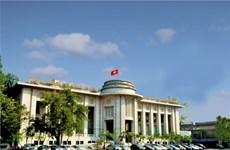Second wave of mergers and acquisitions begins: paper
Experts have claimed a second wave of mergers and acquisitions
(M&A) has begun in Vietnam, the Vietnam Economic News reported,
citing experts as saying that the second one is stronger both in terms
of numbers and value of the transactions.
Experts have claimed a second wave of mergers and acquisitions
(M&A) has begun in Vietnam, the Vietnam Economic News reported,
citing experts as saying that the second one is stronger both in terms
of numbers and value of the transactions.
Specifically, the second wave of M&A in Vietnam occurs in the 2014-2018 period. The organisation board of Vietnam Mergers and Acquisitions Forum 2014 said it was expected that the value of successful M&A transactions in this period would reach 20 billion USD, increasing by 5 billion USD compared with the first wave of M&A in the 2008-2013 period.
Major M&A transactions will take place in areas of banking, production of consumer goods, real estate, information and technology, transport and logistics.
According to editor-in-chief of the Vietnam Investment Review and Head of the organisation board of the Vietnam M&A Forum 2014 Nguyen Anh Tuan, the second wave of M&A took shape based on the recovery of Vietnam’s economy.
GDP growth rate in the first half of this year was 5.18 percent compared with the 4.9 percent increase of the same period last year. Inflation rate was controlled at low levels and the macro-economy has become more stable.
The state management agencies are paying special attention to M&A activity. The legal framework for this trend is becoming more complete as a wide range of important laws relating to business and investment will be revised such as the Investment Law, the Enterprise Law, the Housing Law, the Real Estate Law and the Law on Securities.
Particularly, according to Senior Managing Director of RECOF Corporation Masataka Yoshida, the second wave of M&A was shaped by the accelerated equitisation of state-owned enterprises (SOEs) policy of the Government.
Under the equitisation project approved by the Prime Minister, the Government planned to equitise 432 SOEs in the 2014-2015 period. The Vietnamese Government will continue to check and add more SOEs that need equitised.
The large scale SOEs like Vietnam Airlines, MobiFone and big corporations in the cement and garment, textile industries expected to be equitised in the 2014-2018 period will be important for the development of M&A transactions.
However, it will be not easy to take advantage of this wave as Vietnam still lacks the legal documents that rule M&A transactions. At present, the regulations on M&A are only scattered in the Enterprise Law, the Investment Law, the Competition Law and the civil code. In another aspect, investors said Vietnamese enterprises remained unclear in their financial information, making it difficult for investors in negotiation process.
To successfully take advantage of the second wave, the legal documents on M&A need to be consistent. There should also be a management or monitoring agency on law execution of M&A and is responsible for providing consistent professionalism skills relating to M&A activities.-VNA
Specifically, the second wave of M&A in Vietnam occurs in the 2014-2018 period. The organisation board of Vietnam Mergers and Acquisitions Forum 2014 said it was expected that the value of successful M&A transactions in this period would reach 20 billion USD, increasing by 5 billion USD compared with the first wave of M&A in the 2008-2013 period.
Major M&A transactions will take place in areas of banking, production of consumer goods, real estate, information and technology, transport and logistics.
According to editor-in-chief of the Vietnam Investment Review and Head of the organisation board of the Vietnam M&A Forum 2014 Nguyen Anh Tuan, the second wave of M&A took shape based on the recovery of Vietnam’s economy.
GDP growth rate in the first half of this year was 5.18 percent compared with the 4.9 percent increase of the same period last year. Inflation rate was controlled at low levels and the macro-economy has become more stable.
The state management agencies are paying special attention to M&A activity. The legal framework for this trend is becoming more complete as a wide range of important laws relating to business and investment will be revised such as the Investment Law, the Enterprise Law, the Housing Law, the Real Estate Law and the Law on Securities.
Particularly, according to Senior Managing Director of RECOF Corporation Masataka Yoshida, the second wave of M&A was shaped by the accelerated equitisation of state-owned enterprises (SOEs) policy of the Government.
Under the equitisation project approved by the Prime Minister, the Government planned to equitise 432 SOEs in the 2014-2015 period. The Vietnamese Government will continue to check and add more SOEs that need equitised.
The large scale SOEs like Vietnam Airlines, MobiFone and big corporations in the cement and garment, textile industries expected to be equitised in the 2014-2018 period will be important for the development of M&A transactions.
However, it will be not easy to take advantage of this wave as Vietnam still lacks the legal documents that rule M&A transactions. At present, the regulations on M&A are only scattered in the Enterprise Law, the Investment Law, the Competition Law and the civil code. In another aspect, investors said Vietnamese enterprises remained unclear in their financial information, making it difficult for investors in negotiation process.
To successfully take advantage of the second wave, the legal documents on M&A need to be consistent. There should also be a management or monitoring agency on law execution of M&A and is responsible for providing consistent professionalism skills relating to M&A activities.-VNA













